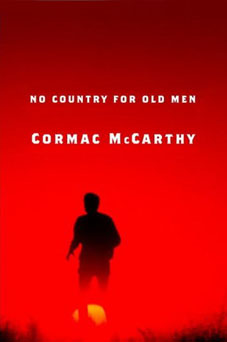A very young-looking Cormac McCarthy (he was 35) in a New York Times book ad from 1968. There are more ads from the paper’s recent past here.
Previously on { feuilleton }
• Cormac McCarthy book covers
A journal by artist and designer John Coulthart.
Cormac McCarthy
A very young-looking Cormac McCarthy (he was 35) in a New York Times book ad from 1968. There are more ads from the paper’s recent past here.
Previously on { feuilleton }
• Cormac McCarthy book covers
Cormac wins another prize
The Road is awarded the James Tait Black Memorial Prize.
We’ve got a trailer and website for the new Coen Bros. film at last. Don’t panic, I won’t bore you to death over this one. Good news is it looks like a very faithful adaptation.
Previously on { feuilleton }
• No Country for Old Men
Cormac McCarthy’s appearance on Oprah’s Book Club—his first television appearance ever—was screened last week. You can watch it online for free on her site although you need to register first. The interview is presented in chunks and only lasts for about twenty minutes but it was worthwhile for all that, even if it is chopped to pieces in that manner typical of American daytime TV.
Most of the discussion skated on the surface but I was surprised (and pleased) when Oprah mentioned having read several of his books, including his ferocious masterwork, Blood Meridian. Main topic was The Road, of course, but we also got to hear something about Cormac’s dedicating himself to a life of precarious unemployment in order to have the freedom to write. He’s playing my tune but I imagine many of Oprah’s viewers would have struggled to comprehend that decision. Faulkner’s name was mentioned, and James Joyce when they talked about the lack of punctuation in his prose. In the end it was enough to simply see the man as a human being sat in a chair. And kudos again to Oprah for championing his work.
Meanwhile, The Sopranos screened its final episode on Sunday night. I watched the last couple of seasons via BitTorrent so I’m privy to the controversial ending which I won’t reveal here even though plenty of news sites have done so already. All I’ll say is I approve of the ending and regard the naysayers as foolish in complaining about a series which throughout its run tried to be different, challenging and better than the half-baked fare which is usually offered as television drama. For those who know the ending (or aren’t so concerned about it), series creator David Chase discussed his intentions and the audience reaction with the New Jersey Star-Ledger.
Update: A David Chase comment from 2001 turned up via the NYT. I’m sure these are sentiments Cormac McCarthy would also agree with.
What’s the difference between what’s art and what isn’t art? That’s the hard question to answer. The only thing that I guess I believe is that a lot of what I see on the air and in other places is giving answers, and I don’t think art should give answers. I think art should only pose questions. And art should not fill in blanks for people, or I think that’s what’s called propaganda. I think art should only raise questions, a lot of which may be even dissonant and you don’t even know you’re being asked a question, but that it creates some kind of tension inside you.
Previously on { feuilleton }
• In praise of Cormac
• Cormac McCarthy book covers
 One of the posters for the new Coen Brothers’ film has finally surfaced and the design is pretty similar to the original book jacket by Chip Kidd (later spoiled with poor type layout in the UK edition). The book cover looks better but we’ll probably see some variations on the poster design anyway. I’m reading the novel at the moment and loving it, so the prospect of a Coens adaptation is rather mouthwatering. This should see them back on form again after the calamity of The Ladykillers and they do the hardboiled thing really well. Cormac McCarthy’s dialogue is spare and witty; Ethan Coen’s characters are either excessively verbose or they hardly speak at all so it’s easy to see the appeal, especially when the plot isn’t so far removed from Blood Simple or Fargo. I’ll be waiting impatiently now for the trailer.
One of the posters for the new Coen Brothers’ film has finally surfaced and the design is pretty similar to the original book jacket by Chip Kidd (later spoiled with poor type layout in the UK edition). The book cover looks better but we’ll probably see some variations on the poster design anyway. I’m reading the novel at the moment and loving it, so the prospect of a Coens adaptation is rather mouthwatering. This should see them back on form again after the calamity of The Ladykillers and they do the hardboiled thing really well. Cormac McCarthy’s dialogue is spare and witty; Ethan Coen’s characters are either excessively verbose or they hardly speak at all so it’s easy to see the appeal, especially when the plot isn’t so far removed from Blood Simple or Fargo. I’ll be waiting impatiently now for the trailer.
Previously on { feuilleton }
• In praise of Cormac
• The poster art of Bob Peak
• A premonition of Premonition
• Cormac McCarthy book covers
• Perfume: the art of scent
• Metropolis posters
• Film noir posters